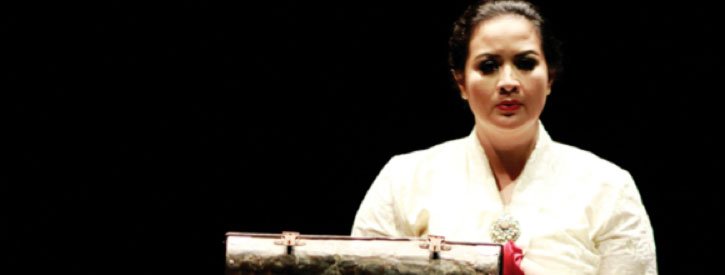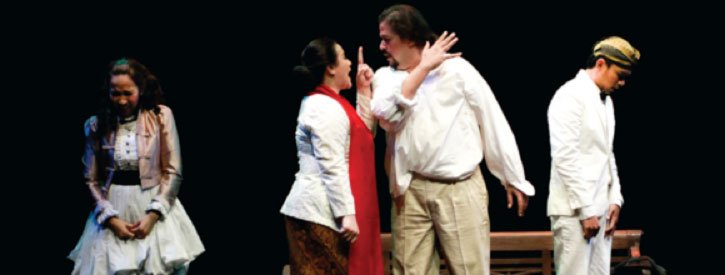Celebrated yearly on April 21, Kartini’s birthday stands as a reminder of the remarkable progress Indonesia has made over the past two centuries in achieving greater equality for women. Grace Susetyo talks to feminist playwright Faiza Mardzoeki about the present status of women in Indonesian society and her recent production at Komunitas Salihara.


Set in the late 1800’s during the period of Kartini’s life, They Call Me Nyai Ontosoroh, recounts the life and struggles of a Javanese concubine, Ontosoroh (Sita Nursanti), to Dutchman Herman Mellema (Willem Bevers). Performed at Salihara on March 25-26, the play is adapted from Pramoedya Ananta Toer’s historical novel This Earth of Mankind. After buying the teenaged Ontosoroh from her father, Mellema educates her, sets up a plantation with her, and together they have a daughter, Annelies (Agni Melati). Ontosoroh leads a good life in Mellema’s plantation but lacks the legal rights of a lawful wife. When Mellema dies, the court orders Annelies to be separated from her Indonesian anti-colonialist husband Minke (Bagus Setiawan) and sends her to the Netherlands, leaving Ontosoroh alone to fight for her rights under Dutch rule.
“Ontosoroh inspires me because she resolutely survives her mountain of struggle, even though she didn’t win in the end,” said Faiza. “She has principles and courageously speaks out the truth, even if it means defying the racially discriminate Dutch court.”
In fact, many of the oppresive situations acted out in the play remain unresolved in today’s Indonesia. “What Ontosoroh’s father did to her still happens today as human trafficking,” Faiza said, adding that Indonesian women still routinely suffer violence at home and religious-based discrimination.
Faiza noted there has been progress in gender equality since 2004, when a quota requiring a minimum of 30 percent female membership in political parties was introduced. “Still, it prompted a rude joke by the PBB (Crescent Star Islamic Party) chairman that in order to meet the quota, party members should engage in polygamy and register their wives and girlfriends as members,” said Faiza, referring to MS Kaban’s comments at a recent assembly.
She said that while the Indonesian government intends to uphold the dignity of women, they often give in to pressure from conservative groups. Provinces such as Aceh and Sumatera Barat have adopted sharia codes, which she said tend to set unjust constraints on women. “For this era, this is a setback,” remarked Faiza. “Patriarchal societies fear the empowerment of women, because it means that men can no longer subjugate women. The heart of the feminist yearns for justice. But for women to achieve this would compromise the goals of conservative fundamentalists.”
The Real Meaning of ‘Kartini’
Many highly educated Indonesians still hold on to paternalistic traditions and gender inequality transcends social classes. In the middle-upper income families, violence against women is commonly manifested through psychological abuse, extramarital affairs and husbands prohibiting wives to work outside the home. Lower-income domestic workers are prone to abuse by the affluent and highly educated, both in Indonesia and abroad.
“What makes gender issues worse in the middle-upper class is the social convention to stay silent and not wash dirty laundry in public,” said Faiza. “Many assert that the home is a private province, whereas marriage is in fact governed by law. Likewise, the government is responsible for legally protecting domestic workers.”
Those who choose to speak out must be prepared to face opposition from a culture that still holds on to many taboos. “Take time to thoroughly understand what you’re speaking out for and what you intend to accomplish by doing so. Learn your legal rights, and find support from likeminded friends,” Faiza advised.
Faiza founded Institut Ungu in 2002, a nonprofit organization that promotes gender equality and human rights through art and culture “I don’t believe in art for the sake of art,” said Faiza. “Art enables human beings to communicate with another. My personal reason for championing women’s rights through theater is because I love it.”
Indonesia’s national heroine Kartini remains a constant inspiration in Faiza’s career as a playwright. “Kartini’s life is a wrestle between two poles,” said Faiza. “On one hand, she loves her father, who is a polyamorous patriarch. But on the other hand, she outspokenly opposes the polygamy in which she is birthed. In those days, to even speak against the system was already a sign of tremendous progress.”
Faiza is saddened when Kartini’s name is misused, as it is in “Kartini Day Sales” at malls, or when she sees kebaya dress codes observed for the day’s celebration. “If you read Kartini’s work, you’ll know that she would reject the commercial image of women portrayed by these malls,” said Faiza. “And if Kartini lived today, she’d probably wear jeans. Kartini was Indonesian, not Javanese. There are many non-Javanese women in this country who don’t traditionally wear kebaya. I think wearing kebaya on Kartini Day works against the spirit of Kartini because it reinforces the domestication of women, or that women should sit pretty at home in elaborate clothes and makeup.
